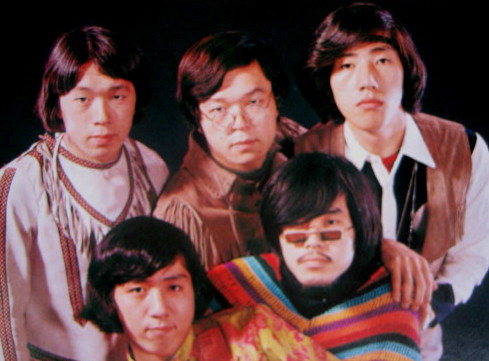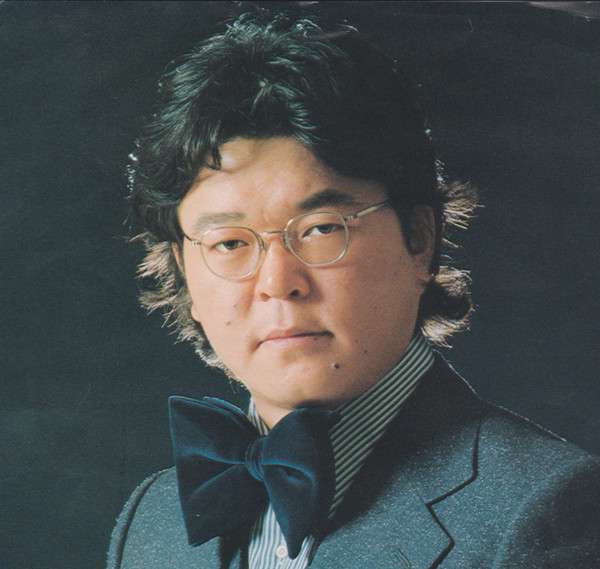
The Mops
Band, JP
Rock
The Mops are one of Japan’s best know “group sounds” bands, particularly noted for their psychedelic period. The group was founded in 1966 by high school friends Mikiharu Suzuki (drums), Taro Miyuki (guitar), Masaru Hoshi (lead guitar) and Kaoru Murakami (bass), playing mostly instrumental rock ala the fabulously popular Ventures. Suzuki’s older brother Hiromitsu joined in later and became the group’s main vocalist, sharing the job with Hoshi. The Mops started playing clubs and discos early on, but did not immediately distinguish themselves. In the summer of 1967 their manager visited San Francisco, and was very excited about the hippie movement that was booming there. He brought a copy of a Jefferson Airplane album back with him to Japan, which he impressed the Mops with. The band became enthusiastic about the new sounds, and singer Hiromitsu Suzuki especially became a big fan of Animals singer Eric Burdon. In what seems a fairly commercially driven decision, the Mops, prodded by their manager, became a “psychedelic band”, and signed with JVC Records. In November 1967 they released “Asamade Matenai”, which went to #38. The Mops album of April 1968 Psychedelic Sound in Japan, was full of flower power flourishes, including cosmic artwork, ethnic clothing, fuzz guitars and sitar playing. It included covers of the Airplane’s hits “Someone To Love” and “White Rabbit”, the Doors' “Light My Fire”, the Animals' “San Franciscan Nights” and “Inside Looking Out”, as well as the Mops theme song “I Am Just A Mops” (which later became a cult favorite after being included on the obscurities album Nuggets 2). To complete the band’s hippie vibe, at their album release party they passed out banana peels to journalists. Much was made of the band being Japan’s first psychedelic band, and they are sometimes credited as pioneering new studio effects, or at least introducing them to Japan. The band also performed with lighting effects, and sometimes blindfolded, supposedly to simulate the influence of drugs. Despite being widely considered a psychedelic band, their original songs were more garage band sounding. Also while most GS bands were playing love songs, the Mops had a song called “Blind Bird”, which contained the lyrics “please kill me”, which led to the song being left off some re-issues (but included on the obscurities collection Boulders #7). In 1969 Murakami quit the band and Miyuki took over bass duties. After just one album with JVC, the group switched to Toshiba/EMI, where they changed their sound to more of a blues rock sound, it seems trying to change with the times. While not as warmly recalled, the band did moderately well after their psychedelic period. Their biggest hit was in 1971, “Gekko Kamen (Moonlight Mask)", which they recorded as a joke, but which became a novelty hit. Their hard rock number “Goiken Muyo (No Excuse)" charted in 1971, and the following year they did well with “Tadoritsuitara Itsumo Amefuri”, which was written for them by popular folk singer Takuro Yoshida. Before finally breaking up in May 1974, the Mops released a total of eight albums on Toshiba/EMI, a long career compared to most of the GS bands. Hoshi continued in the music business as an arranger, and Hiromitsu Suzuki became a TV “talento”. Mikiharu Suzuki today runs a major artist management company.
Members
 | Mikiharu Suzuki dr, voc |
 | Taro Miyuki voc, g |
 | Karo Murakami |
 | Masaru Hoshi voc, g |
 | Hiromitsu Suzuki voc, perc |
Popular Tracks 

Track list and 30sec audio provided by ![]()
Discography
| Title | Artist | Year | Type |
|---|---|---|---|
| Exit | The Mops | 2012 | Album |
| New Best | The Mops | 2005 | Compil. |
| 2001 Millennium+1 Best | The Mops | 2001 | Compil. |
| Iijanaika + Live | The Mops | 1989 | Compil. |
| Big Artist Best Collection モップス | The Mops | 1989 | Compil. |
| 月光仮面 | The Mops | 1981 | Single |
| GS Original Stock 5 | The Mops | 1975 | Compil. |
| Exit | The Mops | 1974 | Album |
| 1969 - 1973 | The Mops | 1973 | Compil. |
| 晴れ 時々 にわか雨 | The Mops | 1972 | Single |
| The Mops Best 4 | The Mops | 1972 | Compil. |
| Golden Disk | The Mops | 1972 | Compil. |
| 雨 | The Mops | 1972 | Album |
| モップスと16人の仲間 | The Mops | 1972 | Album |
| Iijanaika | The Mops | 1971 | Album |
| 雷舞 | The Mops | 1971 | Album |
| Rock Live! | The Mops & The Flowers | 1971 | Album |
| 月光仮面 | The Mops | 1971 | Single |
| Rock 'N' Roll Jam '70 | The Mops, The Flowers, The Happenings Four, The Golden Cups | 1970 | Compil. |
| Jenny Jenny / Participation | The Mops | 1970 | Single |
| ロックン・ロール '70 | The Mops | 1970 | Album |
| House Of The Rising Sun / Body And Soul | The Mops | 1970 | Single |
| Psychedelic Sounds In Japan | The Mops | 1968 | Album |
| ベラよ急げ / 消えない想い | The Mops | 1968 | Single |
| お前のすべてを | The Mops | 1968 | Single |
| 朝まで待てない / ブラインド・バード | The Mops | 1967 | Single |
| モップス・ベスト・4 (Mops Best of 4) | The Mops | Single | |
| たどりついたらいつも雨ふり | The Mops | Single |
